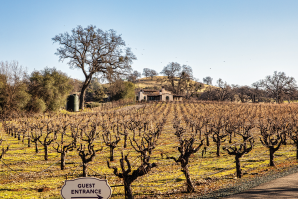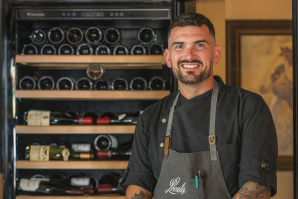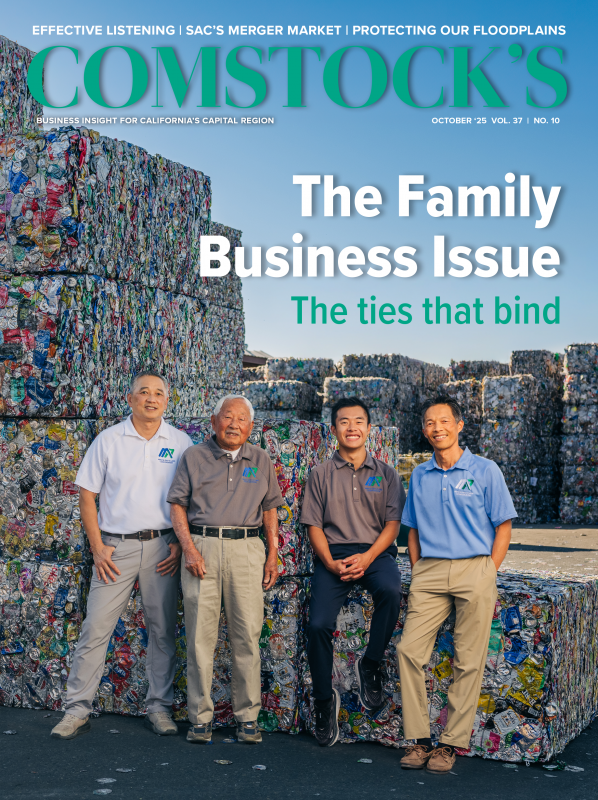In a delicious coincidence, the year that Heringer Estates in Clarksburg introduced its pinot noir was the same year the film comedy about wine lovers, “Sideways,” with its references to the same varietal, hit theaters. “Our sales just soared in 2004,” says Mike Heringer, CEO and winemaker at his eponymous, six-generation family business.
The 500 acres they own and lease, on which the Heringers cultivate their wine grapes, began as a 20-acre spread in 1868 where Heringer’s great-great-great-grandfather, John Heringa, a Dutch dairy farmer, raised 10 head of cattle before flooding — caused by the Delta area’s insufficiently maintained levees — caused him to reconsider what he was going to raise.
“Eventually, they raised basic commodities like alfalfa, hay, corn and tomatoes,” says Mike, who at 46 is the youngest of three siblings who run the family business. Big brother Steve, who’s 50, is general manager of the vineyards, having come home after serving more than a decade as a United States Army pilot, deployed twice to Iran. Middle child Stacy Heringer-McElfish, 48, is manager of the company’s popular wine club.
“It’s yet to be determined if our kids will follow us into the business,” Mike says. “Steve has five, Stacy has three and I have two. So we certainly have the people.” And, he adds, “They’ve all grown up helping us, especially at harvesting time, which runs from August through November. I know I loved it when I was their age. But our parents and grandparents also stressed that we each get a serious education.”
Mike Heringer, who established the current iteration of the business as Heringer Estates 22 years ago, holds a bachelor’s degree in oenology and viticulture from Cal State Fresno. Steve has an engineering degree from UC Davis, and Stacy’s a graduate of Cal Poly San Luis Obispo, where she steeped herself in the special events business.
Heringer Estates prides itself on being certified by the Lodi Winegrape Commission as a “sustainability” business, a designation based on three categories: environmental health, economic profitability, and social and economic equity. “The last one means, ‘Are we good corporate neighbors?’” Mike says. He says the family is “really pleased that our crops are also two-thirds of the way to being certified as 100 percent organic. Next year we’ll be able to make that claim.”
Mike Heringer sounds like a master craftsman when he’s asked what he most enjoys about his work. “For me, it’s being able to work with my hands, to take a raw product — grapes — then guide its transition to wine. I like overseeing every step of the process.”
“It also excites me to know we’re having an impact on our family’s cultural legacy,” he continues. He admits that he also likes the prospect of winning wine industry awards. “When you grow a commodity like hay or alfalfa, you’re not going to get a gold medal for your efforts,” he says with a laugh.
In fact, at the 2023 California State Fair, which annually draws hundreds of entrants to its prestigious commercial wine competition, Heringer Estates was awarded eight gold medals and four silver medals.
Asked if he has a preference for any of his business’s 30 wines, Heringer quips, “This is like asking me to choose which one of my kids I like best.” After a moment, he confesses that the company’s petite syrah and pinot noir are his current favorites. “Now, that could change,” he advises, “based on the next harvest.”
–
Stay up to date on business in the Capital Region: Subscribe to the Comstock’s newsletter today.
Recommended For You

The Industry Is Struggling, but Regional Vintners Think Wine Can Still Win
How lower demand, generational shifts in alcohol and potential Trump tariffs are affecting winemakers
After three decades of growth, the industry has seen three years of negative sales. Grape farmers are being severely undercut by cheaper bulk wine from abroad. Sudden, unpredictable tariff shock is knocking exports and profit margins off kilter. And there’s been studies of late suggesting that Gen Z, those born between 1997 to 2012, is abandoning the wine life and maybe even alcohol altogether. But local growers are optimistic nevertheless.

When There’s a Still, There’s a Way
Amador County winery Iron Hub branches out with its own brandy, starting with a homemade still
Some wineries across America, from the California coast to Maine, have expanded from traditional wine making into the distilling process, using their grapes to make high octane spirits. Here’s how Amador County winemaker Tom Jones keeps his spirits up as the wine industry trends down.

A (Feminine) Touch of Tuscany in Amador County
Founder of Teneral Cellars aims to empower women with every bottle
Teneral Cellars winery in Plymouth is an award-winning, women-owned and self-proclaimed disrupter in the industry. It’s also an oasis in the Shenandoah Valley that’s less than an hour’s drive from Sacramento, though reminiscent of a picturesque wine region in Italy.

According to Michelin, California’s Top Sommelier Is in Sacramento
Chef Chris Barnum-Dann of Localis on his battle with darkness and rise to the top
“I wanted to be the best at everything I’ve ever done in my life,” says Chef Chris Barnum-Dann of Localis, who received the Sommelier Award from the 2025 California Michelin Guide.





